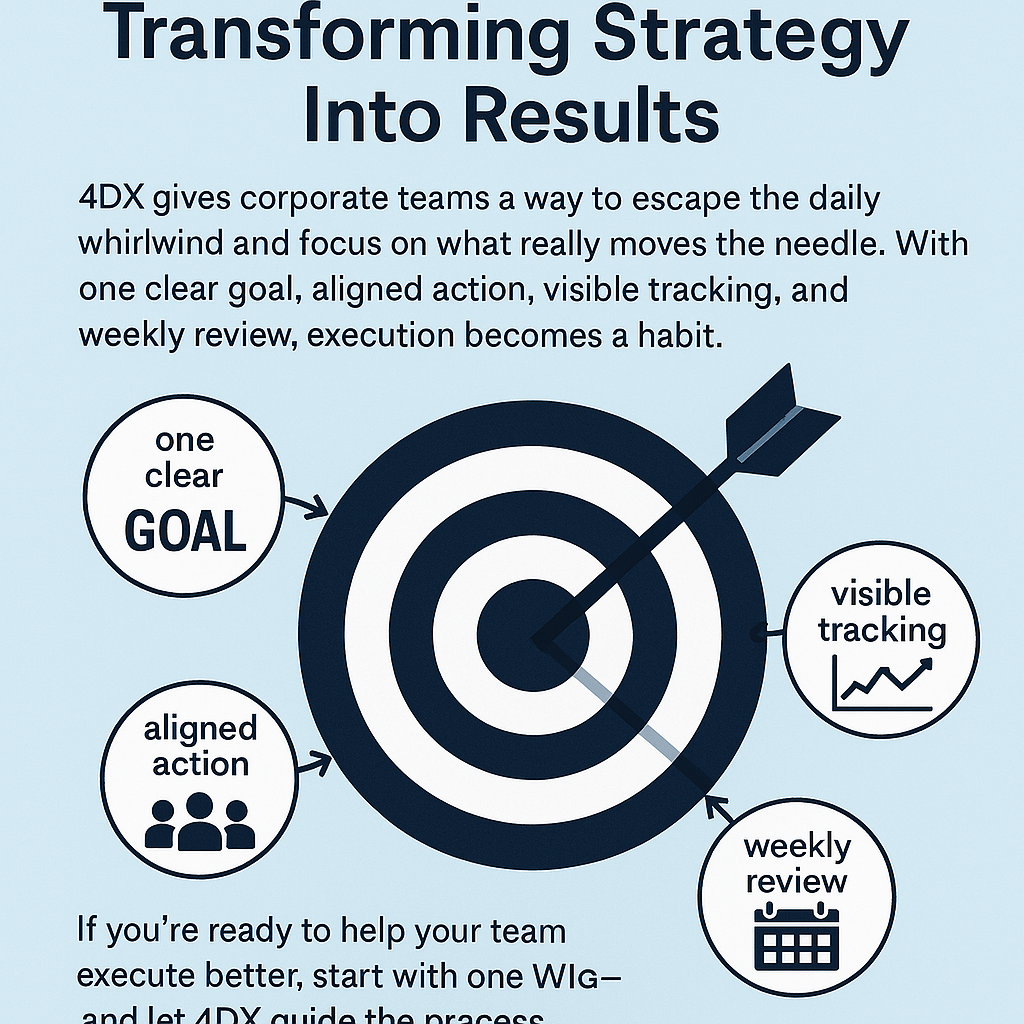In many organizations, strategy fails not because of bad ideas—but because of poor execution. Teams get distracted, misaligned, or overwhelmed by competing priorities. The 4 Disciplines of Execution (4DX) provides a powerful, scalable framework to help corporate teams focus, align, and deliver measurable results.
In this article, we’ll explore how to implement 4DX in a corporate environment to drive performance, accountability, and real progress.
Why Execution Fails in Corporate Settings
Corporate teams often struggle with:
- Too many strategic priorities
- Confusing or inconsistent goals
- Lack of follow-through on initiatives
- Weak accountability or unclear ownership
Even high-performing teams can fall into the trap of reacting to daily “fire drills” and ignoring long-term priorities.
4DX brings structure, visibility, and focus to help teams deliver on what matters most.
Step 1: Identify a Team-Level Wildly Important Goal (WIG)
In a corporate setting, each team or department should have its own Wildly Important Goal that aligns with broader organizational strategy.
Tips:
- Choose one goal that will make the biggest impact
- Use the format: “From X to Y by [date]”
- Ensure the goal is measurable, time-bound, and actionable
Example WIG:
“Reduce customer service response time from 24 hours to 6 hours by October 31”
Step 2: Define Team-Specific Lead Measures
Each team must identify the actions they can control that drive their WIG. These lead measures should be practical, trackable, and predictive.
Examples:
- “Respond to all new tickets within 2 hours”
- “Complete 3 customer service training modules per rep per week”
- “Follow up on unresolved tickets daily”
Let the team contribute ideas. When people help create the plan, they own it.
Step 3: Build and Maintain a Team Scoreboard
A compelling scoreboard is essential to keep the team engaged and aligned. It should be:
- Visible: Posted in a shared workspace or dashboard
- Simple: Easy to understand at a glance
- Real-time: Updated regularly (daily or weekly)
Elements to include:
- The WIG
- Progress on lag measures
- Weekly lead measure performance
Use colors, graphs, and progress bars to make it visually engaging.
Step 4: Establish a Weekly Accountability Meeting
The fourth discipline is where execution truly happens. Set up a weekly team meeting (20–30 minutes) focused on performance, not planning.
Meeting agenda:
- Report on last week’s commitments
- Review the team scoreboard
- Set new commitments for the week
Make this meeting non-negotiable. It keeps everyone aligned, focused, and responsible for their impact.
Leadership’s Role in 4DX Success
Leadership buy-in is critical. Managers must:
- Model focus on the WIG
- Reinforce the importance of lead measures
- Celebrate small wins and maintain urgency
- Keep the 4DX rhythm alive, even during busy periods
A distracted leader = a distracted team.
Benefits of 4DX in a Corporate Team
When applied consistently, 4DX improves:
- Alignment: Everyone works toward the same target
- Engagement: Scoreboards and accountability increase motivation
- Execution: Weekly habits turn strategy into action
- Results: The team meets or exceeds its goals
This method builds a culture of high performance over time.
Common Mistakes to Avoid in Corporate 4DX Rollouts
- Too many WIGs: Stay focused on one per team
- Unclear ownership: Assign responsibilities for lead measures and scoreboard updates
- Lack of buy-in: Involve the team in setting measures and goals
- Inconsistent rhythm: Stick to weekly accountability meetings without fail
Consistency is what transforms 4DX from a concept into a system.
Final Thought: Transforming Strategy Into Results
4DX gives corporate teams a way to escape the daily whirlwind and focus on what really moves the needle. With one clear goal, aligned action, visible tracking, and weekly review, execution becomes a habit.
If you’re ready to help your team execute better, start with one WIG—and let 4DX guide the process.
